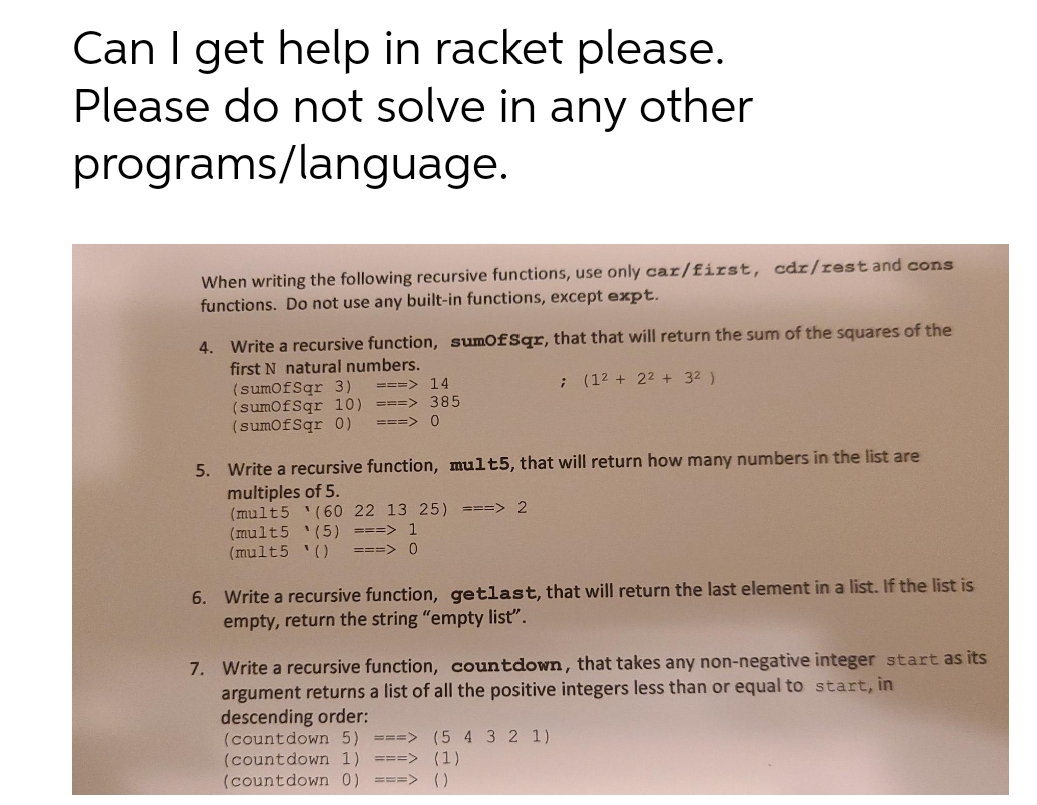4. Write a recursive function, sumofSqr, that that will return the sum of the squares of the first N natural numbers. (sumofSqr 3) (sumofSqr 10) ===> 385 (sumofSqr 0) ===> 14 ; (12 + 22 + 32 ) ===> 0 5. Write a recursive function, mult5, that will return how many numbers in the list are multiples of 5. (mult5 '(60 22 13 25) ===> 2 (mult5 (5) ===> 1 (mult5 '() ===> 0 6. Write a recursive function, getlast, that will return the last element in a list. If the list is empty, return the string "empty list".
4. Write a recursive function, sumofSqr, that that will return the sum of the squares of the first N natural numbers. (sumofSqr 3) (sumofSqr 10) ===> 385 (sumofSqr 0) ===> 14 ; (12 + 22 + 32 ) ===> 0 5. Write a recursive function, mult5, that will return how many numbers in the list are multiples of 5. (mult5 '(60 22 13 25) ===> 2 (mult5 (5) ===> 1 (mult5 '() ===> 0 6. Write a recursive function, getlast, that will return the last element in a list. If the list is empty, return the string "empty list".
C++ Programming: From Problem Analysis to Program Design
8th Edition
ISBN:9781337102087
Author:D. S. Malik
Publisher:D. S. Malik
Chapter15: Recursion
Section: Chapter Questions
Problem 1TF
Related questions
Question

Transcribed Image Text:Can I get help in racket please.
Please do not solve in any other
programs/language.
When writing the following recursive functions, use only car/first, cdr/rest and cons
functions. Do not use any built-in functions, except expt.
4. Write a recursive function, sumofSqr, that that will return the sum of the squares of the
first N natural numbers.
(sumofSqr 3)
(sumofSqr 10) ===> 385
(sumofSqr 0)
===> 14
(12 + 22 + 32 )
===> 0
5. Write a recursive function, mult5,
at will return how many numbers in the list are
multiples of 5.
(mult5 '(60 22 13 25) ===> 2
(mult5 '(5) ===> 1
(mult5 '()
===> 0
6. Write a recursive function, getlast, that will return the last element in a list. If the list is
empty, return the string "empty list".
7. Write a recursive function, countdown, that takes any non-negative integer start as its
argument returns a list of all the positive integers less than or equal to start, in
descending order:
(countdown 5) ===> (5 4 32 1)
(countdown 1) ===> (1)
(countdown 0) ===> ()
Expert Solution
This question has been solved!
Explore an expertly crafted, step-by-step solution for a thorough understanding of key concepts.
This is a popular solution!
Trending now
This is a popular solution!
Step by step
Solved in 3 steps with 3 images

Knowledge Booster
Learn more about
Need a deep-dive on the concept behind this application? Look no further. Learn more about this topic, computer-science and related others by exploring similar questions and additional content below.Recommended textbooks for you

C++ Programming: From Problem Analysis to Program…
Computer Science
ISBN:
9781337102087
Author:
D. S. Malik
Publisher:
Cengage Learning

C++ Programming: From Problem Analysis to Program…
Computer Science
ISBN:
9781337102087
Author:
D. S. Malik
Publisher:
Cengage Learning